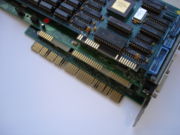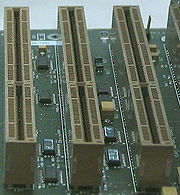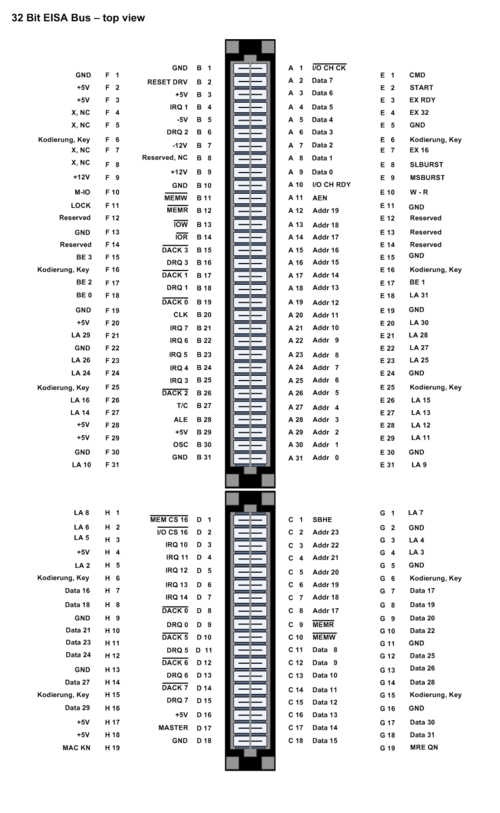Extended Industry Standard Architecture
- Extended Industry Standard Architecture
-

von unten nach oben: EISA, ISA und XT-Anschlüsse

Drei EISA-Slots.
Die Extended Industry Standard Architecture (in der Praxis fast immer nur EISA genannt) ist ein Standardbus, der den ISA-Bus auf 32 Bit erweitert. Außerdem fügt er die Möglichkeit hinzu, den Bus zwischen mehreren CPUs zu teilen. Die Unterstützung für das Bus Mastering ist auch weiter verbessert worden, so dass nun 4 GB Speicher erreichbar sind. Im Gegensatz zum MCA kann EISA ältere Karten vom XT-Bus und von ISA-Bus einsetzen. Dies wird durch ein zweistöckiges Design des Slots und eine Sperrmanschette (verhindert, dass die älteren Karten die neu hinzugekommenen Kontakte berühren) ermöglicht. Die Konfiguration der Erweiterungskarten musste manuell im BIOS getätigt werden, eine automatische Konfiguration wie bei PCI gab es hier noch nicht.
Der EISA-Standard wurde in den späten 1980ern von Compaq initiiert - als Gegenspieler zu IBMs MCA in ihrer PS/2-Serie. Obwohl EISA MCA technisch eigentlich unterlegen war, erlangte es durch seine Rückwärtskompatibilität größere Popularität.
Siehe auch: Industry Standard Architecture (ISA), Micro Channel Architecture (MCA), Peripheral Component Interconnect (PCI), XT-Bus-Architektur
Technische Daten
| Busbreite |
32 Bit |
| einsetzbare Steckkarten |
16 Bit ISA, XT-Bus, 32 Bit EISA |
| Pins |
98 + 100 Inlay |
| Rastermaß |
2,54 mm / 1,27 mm |
| Betriebsspannungen |
+5V, −5V, +12V, −12V |
| Bustakt |
8,33 MHz |
| theoretischer Datendurchsatz (32 Bit) |
zirka 32 MByte/s |
| nutzbarer Datendurchsatz (32 Bit) |
zirka 20 MByte/s |

Wikimedia Foundation.
Schlagen Sie auch in anderen Wörterbüchern nach:
Extended Industry Standard Architecture — Saltar a navegación, búsqueda Tres slots de arquitectura EISA. El Extended Industry Standard Architecture (en inglés, Arquitectura Estándar Industrial Extendida), casi siempre abreviado EISA, es una arquitectura de bus para computadoras… … Wikipedia Español
Extended Industry Standard Architecture — Infobox Computer Hardware Bus name = EISA fullname = Enhanced Industry Standard Architecture caption = Three EISA Slots. invent date = 1988 invent name = Gang of Nine super name = PCI super date = 1993 width = 32 numdev = 1 per slot speed = 8.33… … Wikipedia
Extended Industry Standard Architecture — Carte graphique EISA Le Extended Industry Standard Architecture, ou bus EISA, est un standard d amélioration du bus ISA proposé par Compaq à la tête d un consortium de constructeurs, en réaction à la sortie par IBM du bus MCA. Voir aussi … Wikipédia en Français
Extended Industry Standard Architecture — El Extended Industry Standard Architecture (en inglés, Arquitectura Estándar Industrial Extendida), casi siempre abreviado EISA, es una arquitectura de bus para ordenadores compatibles con el IBM PC. Fue anunciado a finales de 1988 y desarrollado … Enciclopedia Universal
Extended Industry Standard Architecture — Abbreviated EISA, pronounced [ee sah]. A PC bus standard that extends the traditional AT bus to 32 bits and allows more than one processor to share the bus. EISA was developed by the so called Gang of Nine (AST Research, Compaq Computer… … Dictionary of networking
Extended Industry Standard Architecture — type of extended bus, EISA … English contemporary dictionary
Industry Standard Architecture — For other uses of ISA , see Isa (disambiguation). ISA Industry Standard Architecture Five 16 bit and one 8 bit ISA slots on a motherboard Year created 1981 Created by … Wikipedia
Industry Standard Architecture — Ein ISA Steckplatz. Von … Deutsch Wikipedia
Industry Standard Architecture — Buses ISA de una placa base para Pentium I … Wikipedia Español
Industry Standard Architecture — Abbreviated ISA. The 16 bit bus design first used in IBM s PC/AT computer in 1984. ISA has a bus speed of 8MHz and a maximum throughput of 8MBps. EISA (Extended Industry Standard Architecture) is a 32bit extension to this bus … Dictionary of networking



